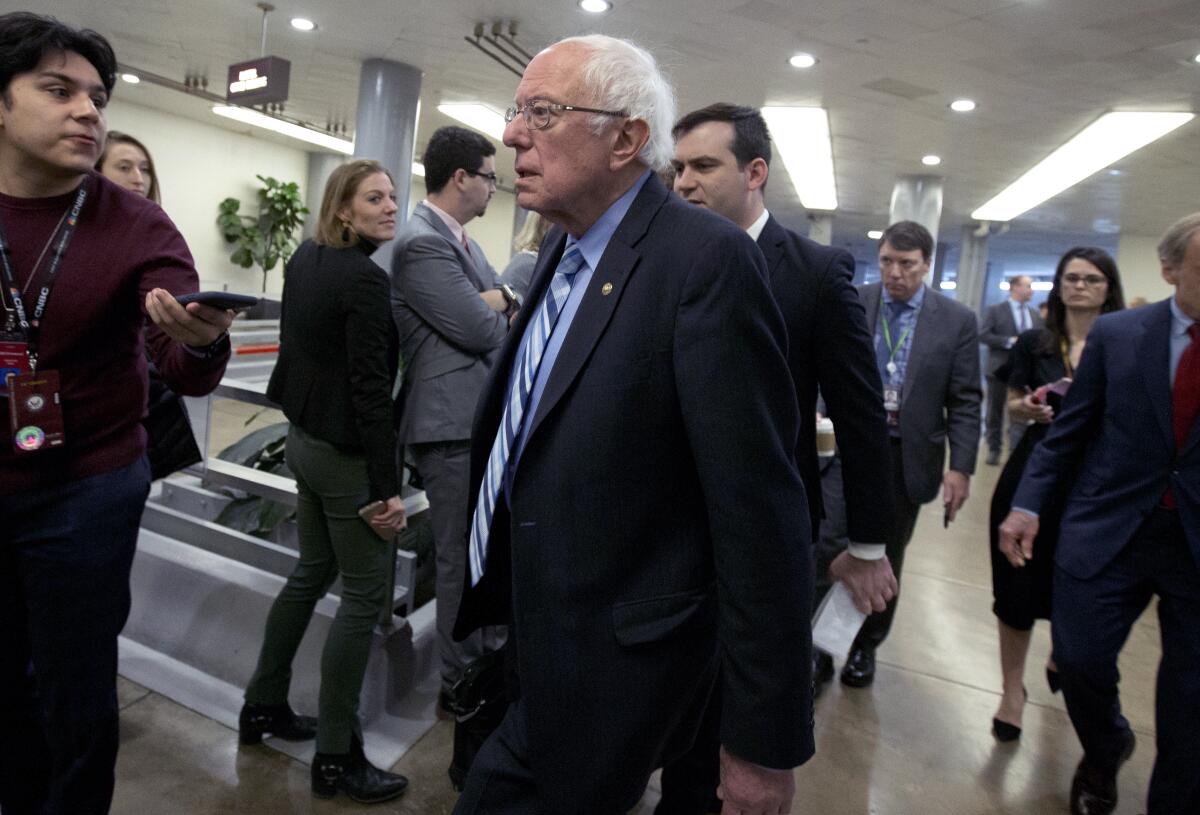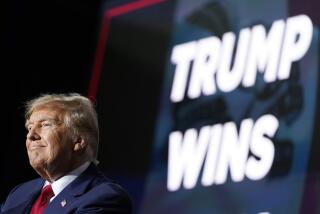Trapped in the Senate, presidential candidates work to stay in touch — and stay awake

Before Sen. Bernie Sanders jetted off from a Des Moines rally early this week to impeachment hearings that have him locked down far from Iowa, the candidate remarked on how prescient his presidential campaign slogan turned out to be.
“‘Us, Not Me’ is becoming very much a reality in the last two weeks of this campaign,” the Vermont senator told the crowd of more than 700 — slightly rewording his “Not Me, Us” slogan.
“Because I am not going to be able to be here as much as I would like. So you guys are going to have to carry the ball.”
As the Iowa campaign comes down to its critical final stretch, some Democratic senators in the race are better prepared to hand the ball over than others.
For the lawmakers anchored to Washington right now, skills on the stump are suddenly less urgent than a finely tuned and well-funded shadow campaign. The tools of modern politics — robust social media and rosters of celebrity surrogates, in particular — are being put to the test as absent candidates try to make their presence felt a thousand miles away.
It’s a tough predicament for Sanders and his fellow senators in the presidential race, Elizabeth Warren of Massachusetts, Amy Klobuchar of Minnesota and Michael Bennet of Colorado, who are left to fidget in their seats in Washington as impeachment proceedings lumber on. They are not allowed to so much as glance at an Apple Watch for campaign updates (lawmakers who slipped in with the watches have since been instructed to leave them at the door, along with all other electronics).
The hearings are as physically draining as a frantic day on the stump, without the political rewards.
Wednesday, early into the 24 hours of argument that House Democrats are scheduled to present, Sanders was slumping in his chair, hands on belly, struggling to keep his head up. Warren looked to be taking notes and methodically drawing what appeared to be elaborate doodles of orderly dots, circles and lines.
She acknowledged that keeping up with her daily regimen of walking 7 miles has been a problem.
“I am way behind right now,” Warren told a CNN reporter.
Staying off coffee — which Warren has forsworn — is tough amid the marathon days, but the rules allowing only water and milk on the Senate floor help. Warren brings in hot and cold cups of water, and confessed to sneaking in a yogurt.
Rivals are making the most of the senators’ absence as the large swath of still-undecided Iowa Democratic voters make their final decisions in advance of the state’s Feb. 3 caucuses.
Tuesday night, some 1,200 rallygoers cheered former South Bend, Ind., Mayor Pete Buttigieg in Cedar Rapids as operatives for the senatorial candidates scrambled to figure out whether their bosses could slip out long enough to interact with voters over livestreams (they couldn’t). Hundreds more voters were out again for Buttigieg on Wednesday morning in Dubuque as the senators were back in lockdown.
Asked whether he had seen all the testimony back in Washington, former Vice President Joe Biden told MSNBC on Wednesday morning that he was too busy at campaign events in Iowa.
The stuck senators are plotting all possible moves to stem damage. They are rewriting campaign budgets, straining every ounce of social media muscle, and scouring their contacts for surrogates to dispatch.
Sanders has enlisted crowd favorite Alexandria Ocasio-Cortez, the New York congresswoman, to carry the mantle at an Iowa City rally Friday night. He’s got Bon Iver lined up for a concert outside Des Moines a week from Friday. Ben Cohen and Jerry Greenfield, aka Ben & Jerry, are scooping ice cream for college students on his behalf up and down New Hampshire.
They may bump into Ashley Judd, who will be talking up Warren there all day Friday. In Iowa, Warren has the twin Castro brothers — former Housing Secretary Julián and Texas congressman Joaquin — splitting up to make the case for her at nine events over three days.
Lower-profile campaigns promise what they lack in star power will be replaced with grit.
“I will find one way or another to run for president,” Klobuchar said outside the Senate chamber. “I actually have my family there [campaigning] right now. They are really good.”
Her daughter has taken over Klobuchar’s Twitter feed. Klobuchar “hot dish house parties” are scheduled through the state. She had a tele-town hall optimistically planned for 8:30 p.m. Iowa time Wednesday, just after the day’s trial session was scheduled to wrap.
Bennet promised tele-town halls and Facebook Live appearances. But such virtual campaigning is a much heavier lift for those cash-poor candidates than it is for Sanders and Warren, who have state-of-the-art production infrastructure and social media followings that enable them — at a moment’s notice — to amass an audience that might rival that of a cable news broadcast.
Warren was not able to slip out long enough Tuesday to broadcast to voters, so on Wednesday her campaign revised its game plan to focus on taped chats about corruption in Washington that it is calling “big structural conversations.”
A sophisticated broadcast operation will help only so much in Iowa and New Hampshire, where voters expect to meet their candidates in person — often multiple times.
Audiences just don’t embrace beamed-in candidates the same way they do actual candidates, said David Redlawsk, a political scientist from the University of Delaware traveling Iowa to study the caucuses. He was at an event in Des Moines on Sunday that Buttigieg attended by Skype.
“It was not the same,” Redlawsk said. ”He wasn’t engaged by the crowd.”
But being stuck in Washington does come with some campaign advantages. Impeachment dominates the news — including in Iowa — and these senators are in the middle of it. The cable news networks are desperate to hear from them on the few breaks the senators have, and every one of those cable hits can be helpful to a campaign.
Biden’s awkward role as a focus of the trial also mitigates his advantage of being able to roam Iowa and New Hampshire. Republicans are constantly threatening to call Biden and his son Hunter, as witnesses to address questions about Hunter Biden’s business dealings in Ukraine.
Biden was confronted at two different stops in Iowa by questions about whether Democrats were mulling a deal in which Hunter Biden could be called as a witness if John Bolton, a key former administration official, also testified.
“No, they are not,” Biden said repeatedly at the first stop when asked about Democrats discussing the idea. Later in the day, he said he would not sign off on such a deal.
“This is a constitutional issue,” he said. “We’re not going to turn it into a farce or political theater. I want no part of that.”
Senate Democratic leader Charles E. Schumer of New York said late Wednesday that the idea of such a trade was “off the table.”
The candidate who may have the most to lose is Klobuchar. She struggled throughout the race to break into the top tier and was finally showing signs of momentum just before she got yanked back to Washington, having won the endorsement of a major newspaper in Iowa, the Quad Cities Times, and shared another — with Warren — from the New York Times.
Like the other candidates tied down in the Senate, Klobuchar is trying to make the best of it. That involves leaning into her role as an impeachment juror.
When one of President Trump’s attorneys sniped during the hearings that “some of you are upset because you should be in Iowa,” Klobuchar snapped back with a tweet that quickly generated 74,000 likes.
“No. This is my constitutional duty. And I can do two things at once.”
Times staff writers Noah Bierman and Jennifer Haberkorn contributed to this report.
More to Read
Get the L.A. Times Politics newsletter
Deeply reported insights into legislation, politics and policy from Sacramento, Washington and beyond. In your inbox three times per week.
You may occasionally receive promotional content from the Los Angeles Times.








